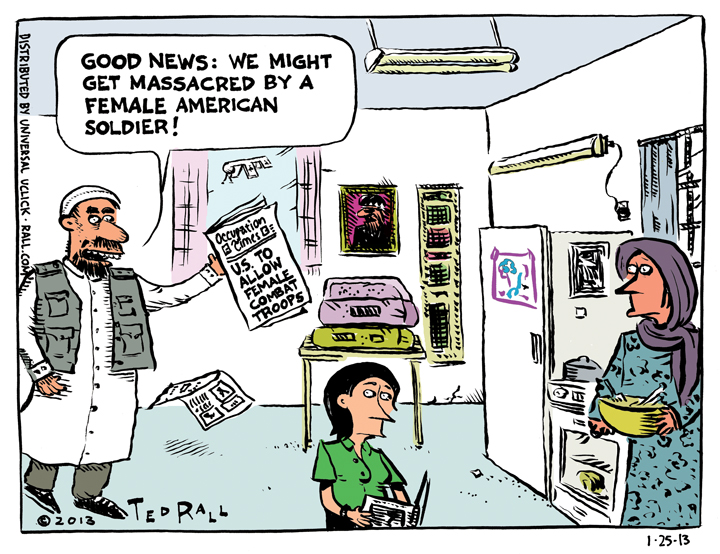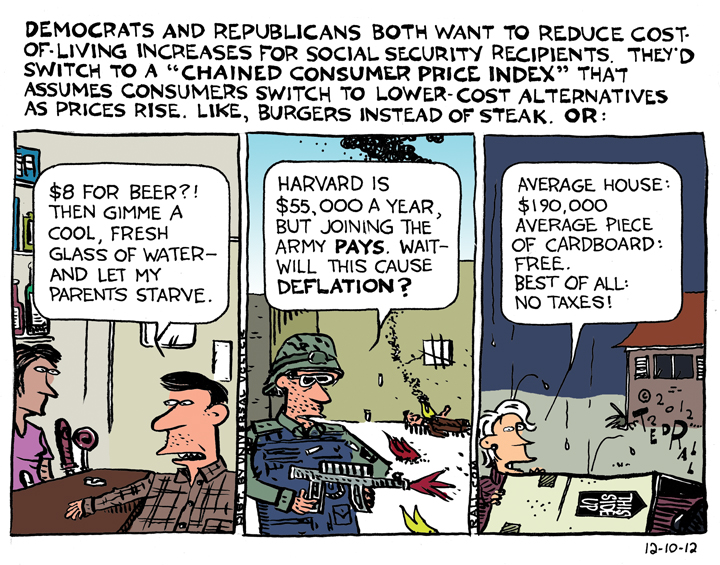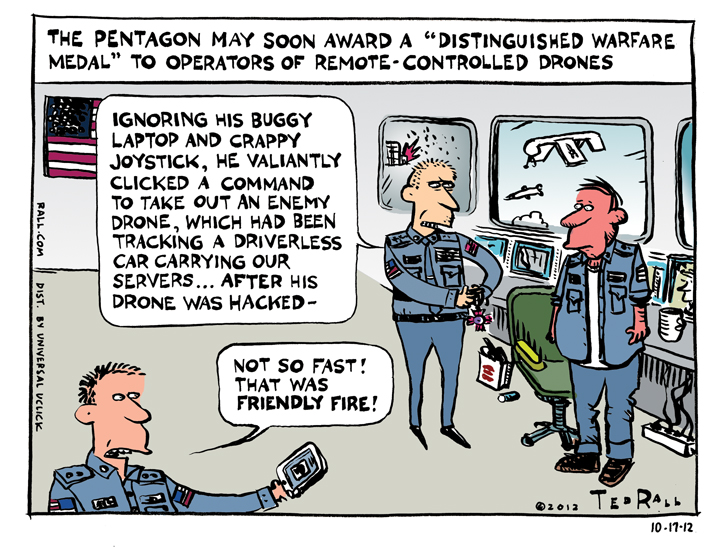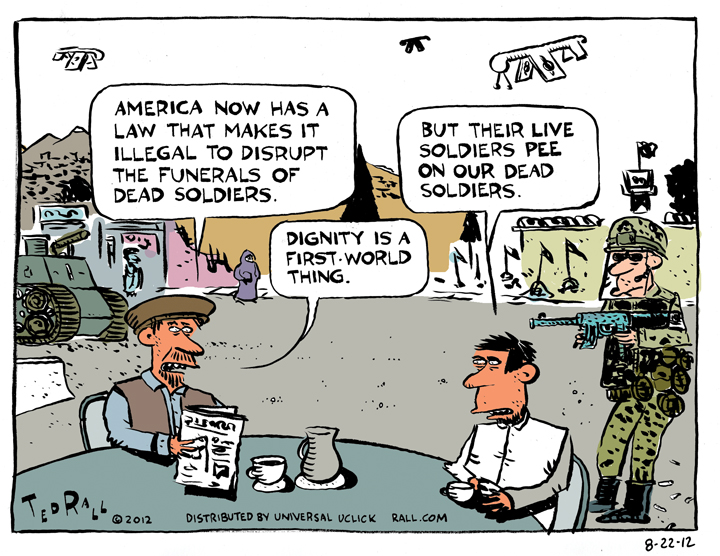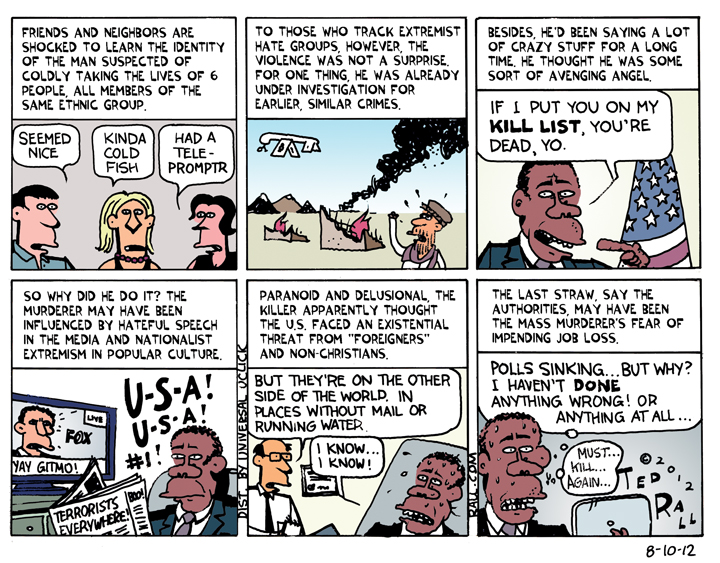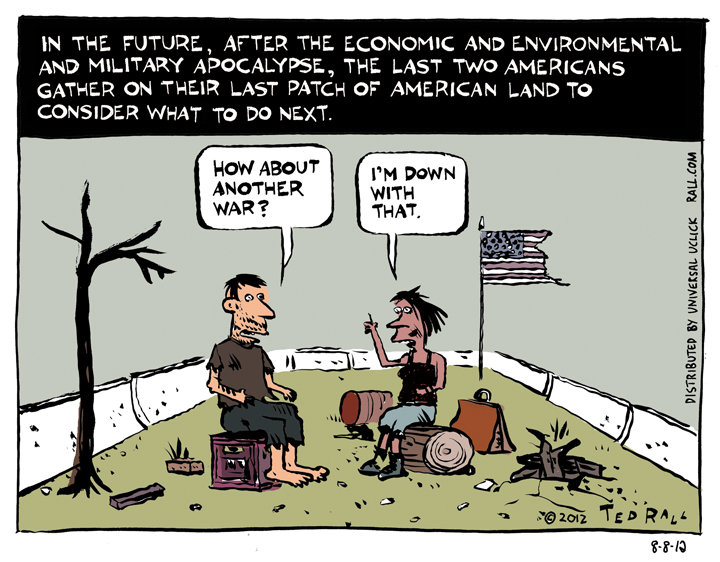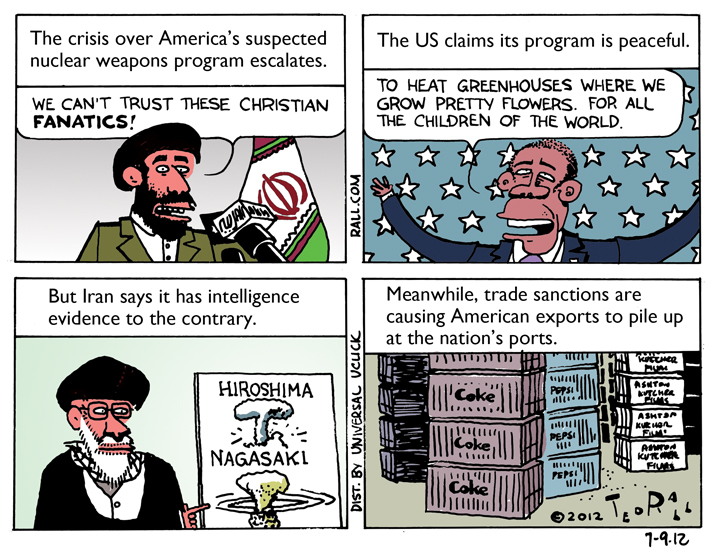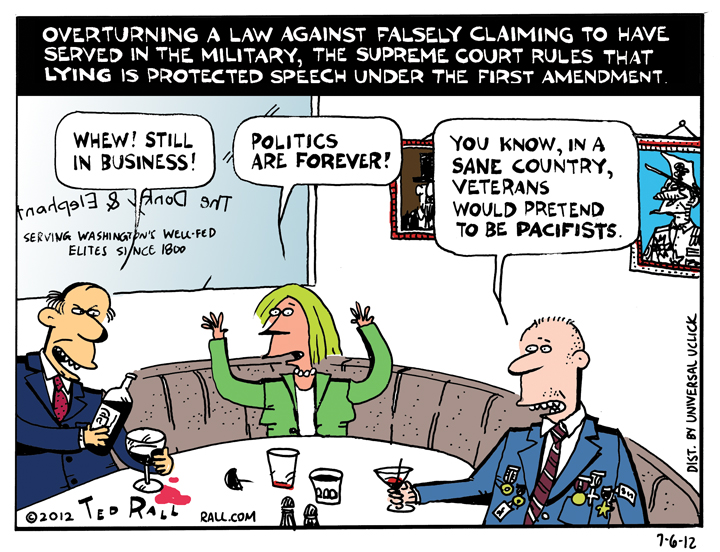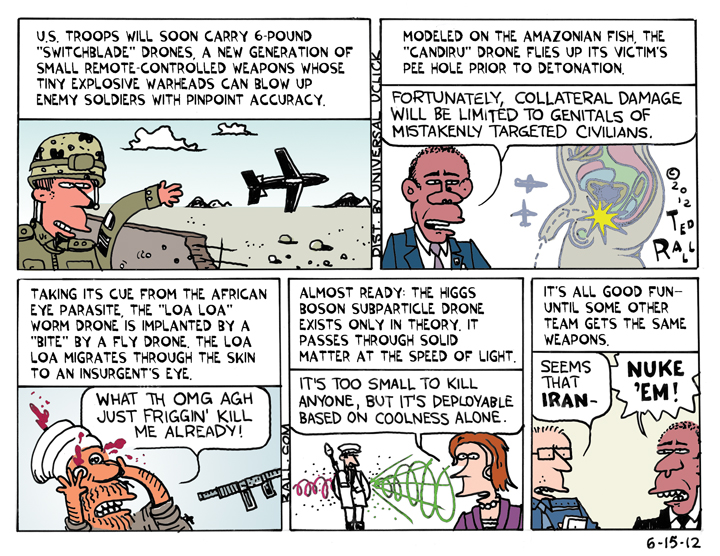Outgoing Defense Secretary Leon Panetta has announced that women will be allowed to serve actively and openly as combat troops in America’s ongoing wars. It’s always nice to see women get the same rights as men to go out and kill innocent Muslim people.
Chained CPI
Democrats and Republicans both want to reduce the deficit using an accounting gimmick called “Chained CPI.” Under the Chained Consumer Price Index, increases in prices of products are ignored. Instead, it is assumed that consumers downgrade their purchases to cheaper products when prices for those they currently buy increase to the point that they can no longer afford them. Then the government uses these phony calculations to justify smaller cost of living increases to recipients of Social Security and other beneficiaries of programs indexed to inflation.
Self-Respect
President Obama signed a new law last week that broadens federal limits on protests at military funerals for members or former members of the Armed Forces. The changes cover services held in private places as well as military cemeteries. Apparently this excessive respect for the war dead only applies to dead Americans.
Profiling the Mass Murderer
Friends and neighbors are shocked to learn the identity of the man suspected of coldly taking the lives of six people, all members of the same ethnic group. To those who keep track of extremist hate groups, however, the violence was not a surprise. For one thing, he was already under investigation for earlier, similar crimes
SYNDICATED COLUMN: Iran – Because Two Wars Aren’t Enough
Why Doesn’t Anyone Call Out Romney for Warmongering?
Mitt Romney had a barnburner of a weekend in Israel. The GOP nominee apparent shared his unique combination of economic and anthropological wisdom, attributing the fact that Israel’s GDP and average income is many times higher than those of the Palestinian Occupied Territories to Israelis’ superior “culture.”
As if spewing one of the most overtly racist lines in recent presidential campaign history wasn’t enough, eschewing “containment” (read: “diplomacy”), Romney also endorsed a preemptive Israeli military strike against Iran in order to prevent the latter’s nuclear program—Israel’s own, illegal nuclear weapons stockpile is OK since it’s a U.S. ally—from moving forward.
“We have a solemn duty and a moral imperative to deny Iran’s leaders the means to follow through on their malevolent intentions,” Romney said, stating that “no option should be excluded.”
He didn’t say how he knew the intentions of Iran’s leaders. Clairvoyance? Bush had it too.
Though Mitt slightly walked back his campaign’s sabre rattling, the message was clear. If he is elected, Israel will receive a blank check to begin a war against Iran, one of the most well-equipped military powers in the Middle East—a conflagration in which the United States could easily wind up getting dragged into. (In a subsequent interview he reiterated that “we have all options on the table. Those include military options.”)
Most criticism focused on Romney’s flouting of the traditional proscription against candidates questioning a sitting president’s foreign policy while visiting foreign soil. Though, to be fair, the differences between his and President Obama’s approach to Israel and Iran are tonal and minor.
As usual with the U.S. media, what is remarkable is what is going unsaid. Here we are, with the economy in shambles and the public worried sick about it, the electorate tired of 12 years of war against Afghanistan and nine against Iraq, yet Romney—who could be president six months from now—is out ramping up tensions and increasing the odds of a brand-new, bigger-than-ever military misadventure.
Warmongering has gone mainstream. It’s a given.
In a way, Romney’s willingness to risk war against Iran is merely another example, like the car garage and dressage, of how clueless and out of touch he is. Most Americans oppose war with Iran. For that matter, so do the citizens of the country on whose behalf we’d be killing and dying, Israel. But even Romney’s Democratic opponents give him a pass for Romney’s tough-guy act on Iran.
The reason for the somnolent non-response is obvious: it’s nothing new. Year after year, on one foreign crisis after another, American presidents repeatedly state some variation on the theme that war is always an option, that the military option is always on the table. You’ve heard that line so often that you take it for granted.
But did you know that “keeping the military option on the table” is a serious violation of international law?
The United States is an original signatory of the United Nations Charter, which has the full force of U.S. law since it was ratified by the Senate in 1945. Article 51 allows military force only in self-defense, in response to an “armed attack.” As Yale law and political science professor Bruce Ackerman wrote in The Los Angeles Times in March, international law generally allows preemptive strikes only in the case of “imminent threat.” In 1842 Secretary of State Daniel Webster wrote what remains the standard definition of “imminent,” which is that the threat must be “instant, overwhelming, leaving no choice of means and no moment for deliberation.” The enemy’s troops have massed on your border. They have superior force. What must be done to stop them is evident. There’s no time for diplomacy.
Iran’s nuclear program doesn’t come close to this definition, even from Israel’s standpoint. Bruce Fein, deputy attorney general under Reagan, told Fairness and Accuracy in Reporting’s Extra! Magazine: “It is nothing short of bizarre to claim, as the Obama Administration is doing, that the mere capability to make a bomb is justification for a preemptive attack. That’s a recipe for perpetual war. Almost any country could have the capability to make a bomb. They are torturing the word ‘imminent’ to the point that it has no meaning.”
By endorsing an Israeli attack against Iran at a time when there is no proof that Iran has nuclear weapons, intends to develop them, or use them if it does, Romney is going farther than Obama, who has engaged in back-channel diplomacy.
The Allies’ main brief against the Nazi leaders tried at Nuremberg was not genocide, but that they had violated international law by waging aggressive war. Yet every American president has deployed troops in aggressive military actions.
Aggressive war hasn’t been good for America’s international image, the environment, our economy or the millions who have died, mostly for causes that are now forgotten or regretted. But unless we draw the line against reckless, irresponsible rhetoric like Romney’s, it will go on forever.
(Ted Rall’s new book is “The Book of Obama: How We Went From Hope and Change to the Age of Revolt.” His website is tedrall.com. This column originally appeared at NBCNews.com)
(C) 2012 TED RALL, ALL RIGHTS RESERVED.
Every Lie is Sacred
In a little-noticed ruling issued concurrent to the Affordable Care Act, the U.S. Supreme Court overturned the Stolen Valor Act, which made it a crime to lie about having served in the military. Which made me think, (a) who’d want to admit they were in the military if they had been, much less brag about it if they hadn’t, and (b) politicians must be grateful now that their favorite activity–lying–has been deemed worthy of First Amendment protection.

